Difference between revisions of "Ceratotheca triloba"
Bot. Mag. 114: plate 6974. 1888.
FNA>Volume Importer |
FNA>Volume Importer |
||
| Line 22: | Line 22: | ||
|name=Ceratotheca lamiifolia | |name=Ceratotheca lamiifolia | ||
|authority=(Engler) Engler | |authority=(Engler) Engler | ||
| − | }}{{Treatment/ID/Synonym | + | }} {{Treatment/ID/Synonym |
|name=Sesamum lamiifolium | |name=Sesamum lamiifolium | ||
|authority=Engler | |authority=Engler | ||
| Line 40: | Line 40: | ||
|elevation=0–100 m. | |elevation=0–100 m. | ||
|distribution=Fla.;s South Africa (Natal). | |distribution=Fla.;s South Africa (Natal). | ||
| − | |discussion=<p>Plants of Ceratotheca triloba resemble those of Digitalis with their tall, herbaceous habit, secund racemes curved toward the tip, and drooping, tubular flowers. Capsules of C. triloba are four-locular and have two subapical, hornlike appendages, basal leaves sometimes three-foliolate, and corolla lobes relatively large and rounded. Plants escaped from cultivation are known from Highlands and Lake counties.</p><!-- | + | |discussion=<p>Plants of <i>Ceratotheca triloba</i> resemble those of <i>Digitalis</i> with their tall, herbaceous habit, secund racemes curved toward the tip, and drooping, tubular flowers. Capsules of <i>C. triloba</i> are four-locular and have two subapical, hornlike appendages, basal leaves sometimes three-foliolate, and corolla lobes relatively large and rounded. Plants escaped from cultivation are known from Highlands and Lake counties.</p><!-- |
| − | --><p>Another species, Ceratotheca sesamoides Endlicher, distinguished by smaller flowers, dense indument, and all leaves simple, is sometimes cultivated in the flora area.</p> | + | --><p>Another species, <i>Ceratotheca</i> sesamoides Endlicher, distinguished by smaller flowers, dense indument, and all leaves simple, is sometimes cultivated in the flora area.</p> |
|tables= | |tables= | ||
|references= | |references= | ||
| Line 66: | Line 66: | ||
|publication year=1888 | |publication year=1888 | ||
|special status=Introduced;Selected by author to be illustrated | |special status=Introduced;Selected by author to be illustrated | ||
| − | |source xml=https://jpend@bitbucket.org/aafc-mbb/fna-data-curation.git/src/ | + | |source xml=https://jpend@bitbucket.org/aafc-mbb/fna-data-curation.git/src/8f726806613d60c220dc4493de13607dd3150896/coarse_grained_fna_xml/V17/V17_782.xml |
|genus=Ceratotheca | |genus=Ceratotheca | ||
|species=Ceratotheca triloba | |species=Ceratotheca triloba | ||
Revision as of 15:03, 18 September 2019
Stems branched proximally, slightly 4-angled, 50–150 cm. Leaves: petiole 2–10(–15) cm, hairy; blade broadly ovate to cordate or triangular, 3–10(–20) × 3–10 cm, base rounded to cordate, apex obtuse to acute. Inflorescences secund. Pedicels 2–4 mm; bracteoles 0–2, linear. Flowers drooping; sepals often purple distally, 7–10 mm; corolla 25–40 mm, glandular-pubescent externally, strongly curved at base, mouth 15 mm diam. Capsules 20–30 × 4–5 mm. Seeds 2–4 mm, smooth. 2n = 32 (Africa).
Phenology: Flowering Jul–Nov.
Habitat: Disturbed sites.
Elevation: 0–100 m.
Distribution
Fla., s South Africa (Natal).
Discussion
Plants of Ceratotheca triloba resemble those of Digitalis with their tall, herbaceous habit, secund racemes curved toward the tip, and drooping, tubular flowers. Capsules of C. triloba are four-locular and have two subapical, hornlike appendages, basal leaves sometimes three-foliolate, and corolla lobes relatively large and rounded. Plants escaped from cultivation are known from Highlands and Lake counties.
Another species, Ceratotheca sesamoides Endlicher, distinguished by smaller flowers, dense indument, and all leaves simple, is sometimes cultivated in the flora area.
Selected References
None.
